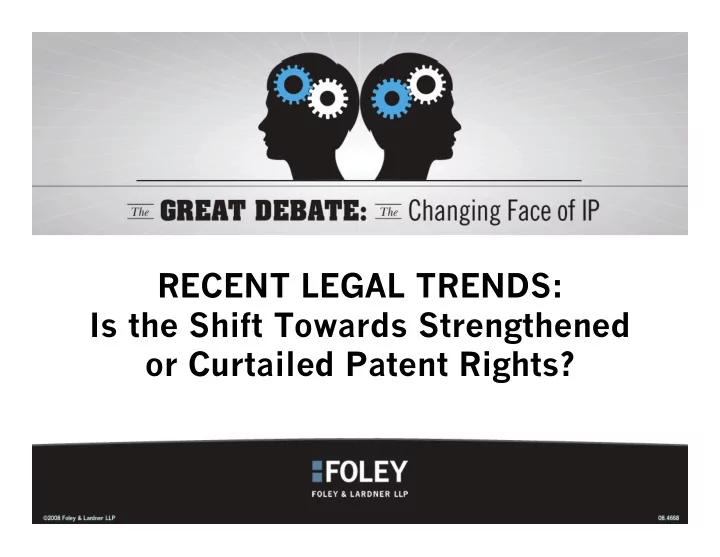

RECENT LEGAL TRENDS: Is the Shift Towards Strengthened or Curtailed Patent Rights?
CASES TO DEBATE � Medimmune, Inc. v. Genentech, Inc. , 549 U.S. 118 (2007) � Quanta Computer, Inc. v. LG Elecs., Inc. , 128 S.Ct. 2109 (2008) � In re Bilski , Appeal No. 2002-2257 (PTO Board of Patent Appeals and Interferences 2006) � Paymentech/Muniauction Cases, 498 F.3d 1373 (Fed.Cir.2007); 532 F.3d 1318 (Fed.Cir.2008)
� Andrea Augustine , Partner, IP Litigation Practice � Pavan Agarwal , Chair, Electronics Practice � Charles Kwalwasser , Barclays Capital � David Moyer , Senior Counsel, Litigation, Chevron Global Upstream & Gas � Michael Springs , Assistant General Counsel, Bank of America � Earle Thompson , Chief Intellectual Property Counsel, SanDisk Corporation
Medimmune, Inc. v. Genentech, Inc. � Issue : Does the “actual controversy” requirement require a patent licensee to be in breach of license agreement before seeking a declaratory judgment that the patent is invalid, unenforceable or not infringed? � Federal Circuit : Affirmed District Court’s dismissal of declaratory judgment claims
Medimmune, Inc. v. Genentech, Inc. � Supreme Court : Reversed Federal Circuit decision (8-1 decision, Thomas, J., dissenting) � Answer : No. Article III does not require patent licensee to breach license agreement before seeking declaratory judgment of invalidity, unenforceability or non-infringement.
Medimmune: Unanswered Questions � Is an “invitation” to take a paid license enough to create a controversy? Does this effect notice? � Where should the Federal Circuit draw the line on what is sufficient, given the competing policies? � Can and should licensors require: notice of suit? automatic-termination of license? increased royalties?
Quanta Computer, Inc. v. LG Elecs., Inc. � Issue 1 : Whether patent exhaustion applies to method claims? � Issue 2 : Whether patent exhaustion applies to sale of components of patented system that must be combined with other components to practice the patented system?
Quanta Computer, Inc. v. LG Elecs., Inc. � Supreme Court : Reversed Federal Circuit decision, and ultimately found patent exhaustion (unanimous decision) � Answer : – Patent exhaustion applies to method claims – Patent exhaustion applies to sale of component that is capable of use only in practicing the patented method (and?) embodies the essential feature of the patented invention
Quanta: Unanswered Questions � Can a patentee retain any rights after the first sale? � What creative licensing schemes can a patentee employ post- Quanta ? � Can a covenant-not-to-sue be used instead of a license? � Does exhaustion of a single claim exhaust the entire patent, or is the analysis claim-by-claim?
Quanta: Unanswered Questions � How far does the practicing of patent A go to exhausting patent B? � Are international sales implicated? � Is this just an electronics issue?
In re Bilski � Issue at PTO : Whether rejected claims are directed to patent-eligible subject matter under 35 U.S.C. § 101. � PTO : Affirmed Examiner’s rejection of Bilski’s claims as directed to non-statutory subject matter.
In re Bilski: Claim 1 A method for managing the consumption risk costs of a commodity sold by a commodity provider at a fixed price comprising the steps of: (a) initiating a series of transactions between said commodity provider and consumers of said commodity wherein said consumers purchase said commodity at a fixed rate based upon historical averages, said fixed rate corresponding to a risk position of said consumer; (b) identifying market participants for said commodity having a counter-risk position to said consumers; and (c) initiating a series of transactions between said commodity provider and said market participants at a second fixed rate such that said series of market participant transactions balances the risk position of said series of consumer transactions.
In re Bilski: Questions Presented (1) Whether claim 1 claims patent-eligible subject matter under 35 U.S.C. § 101? (2) What standard(s) govern determination of whether a process claim is patent-eligible? (3) Whether claim is not patent-eligible for constituting an abstract idea or mental process? (4) Must a process result in physical transformation or be tied to a machine to be patent-eligible? (5) Is it appropriate to reconsider State Street Bank ?
In re Bilski: Nothing is Answered Yet � What is the likelihood that: – An entire class of patents will be eliminated? – Only disembodied ideas will be eliminated? – State Street Bank will be overruled or limited? � What test should the Federal Circuit adopt? � Can the PTO realistically examine non- technical subject matter? � Will the Supreme Court look at this case?
Paymentech/Muniauction Cases � General Issue : Where no single party performs all acts of a patented combination of method steps but several parties collectively (but not under the direction of any one party) perform all the steps, does infringement liability attach under a theory of “joint infringement.”
Paymentech/Muniauction Cases � Paymentech : (Fed. Cir. 2007) – “where the actions of multiple parties combine to perform every step of a claimed method, the claim is directly infringed only if one party exercises ‘control or direction’ over the entire process such that every step is attributable to the controlling party, i.e., the ‘mastermind.’” � Muniauction : (Fed. Cir. 2008) – a method claim is only infringed when a single party can be charged with performing each step of the asserted claim. Since defendant neither performed every step of the claimed methods nor had another party perform steps on its behalf, the Court found no infringement.
Paymentech/Muniauction: Unanswered Questions � What constitutes a “mastermind”? � What are the outer boundaries of a contractual obligation or other relationship that gives rise to vicarious liability necessary in order for a court to find "direction or control”? � Is this just a claim drafting “gotcha”?
Recommend
More recommend